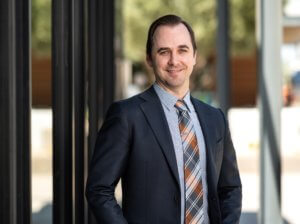by Bryan McLaren, CEO and chair at Zoned Properties, Inc.
Environmental, Social, and Governance (ESG) initiatives are central to the evolving business landscape as more organizations dedicate resources to amplify their social impact, execute on purpose-driven goals, and ultimately create long-term value.
Pressure from stakeholders and shareholders has been instrumental in transforming how organizations are planning for the future. In the Accenture Future of Work Study 2021, 65% of employees believe organizations should be responsible for leaving their people “net better off” through work and 71% of consumers believe ethical corporate practices and values are an important reason to choose a brand. But even beyond this shift in demand for company transparency and a more defined investment in communities from corporations, ESG reporting will soon be a necessity for public companies and a variety of financial organizations.
The Securities and Exchange Commission’s climate-related disclosure earlier this year is a major shift in how companies will be structured requiring corporate entities to proactively integrate ESG into their business model.
Though the proposed rules will most likely lead to legal challenges, accepting the realities of where global business stands today and the environmental issues communities are facing should be at the forefront of every cannabis business, whether they are public or private. There will also inevitably be opportunities that develop from these policies to engage with stakeholders and increase value.
Recent data illustrate the positive results of adopting new standards and reporting methods. According to the Accenture Future of Work Study 81% of sustainable stock indices outperformed their peer benchmarks in 2020. ESG focuses on the Triple-Bottom-Line principles, which essentially advocates for a balance between people, profit, and planet when considering any program or project within an organization. Sustainability professionals who have been advocating for both ESG and Triple-Bottom-Line principles will likely not be surprised by these statistics, as their focus on a long-term, balanced approach to creating value can be less subject to the waxing and waning fluctuations that come with the single-bottom-line approach of focusing only on short term profit.
ESG in Cannabis Real Estate
It is essential for cannabis companies to make ESG initiatives a priority as more investors look to these frameworks as potential predictors for future success. Already some cannabis license applications are requiring environmental impact statements and state-level environmental compliance documentation.
The cannabis industry also has a unique opportunity as a relatively young and emerging industry. Many cannabis companies already have the capacity and infrastructure to adapt swiftly to changing regulations. In the new era of ESG, cannabis corporations are in the position to make these principles a part of their core narrative early on and become more attractive to investors.
In commercial real estate, here are some of the most relevant ESG initiatives to consider.
- ENERGY MANAGEMENT (e.g. Utility Installation & Efficiency)
- WATER & WASTE WATER MANAGEMENT (e.g. Water Use & Treatment)
- PRODUCT DESIGN & LIFECYCLE MANAGEMENT (e.g. Building Operations)
- PHYSICAL IMPACTS OF CLIMATE CHANGE. (e.g. Indoor Air Quality)
These are based on the Sustainability Accounting Standards Board’s (SASB) materiality finder for real estate, which also provides insight across a broad range of industries for those interested in other sectors.
There are many ways to begin monitoring and collecting data that will help provide a clearer picture of a cannabis facility’s operational efficiency. For facilities already existing in the cannabis ecosystem, property owners and operators should consider investing in eco-friendly waste management initiatives, repurposing materials when possible, and ensuring recycling capabilities at every operation. Utilizing technology platforms to track water consumption and overall environmental performance will allow an operation to investigate what opportunities exist to reduce energy use by replacing equipment or introducing more natural ventilation into spaces to reduce heating and cooling use.
For those in the early stages of a cannabis real estate project, industry professionals should make ESG initiatives a part of their buildout strategy from the beginning. This means addressing the potential physical risks and impacts on a building where you’re looking to develop. Is the property in a flood zone and at risk of rising sea levels? Is the potential building site exposed to other natural disasters like wildfires?
Many of these environmental and climate-related risks also intersect on a social level. In cannabis real estate, companies should consider whether a building and its materials are safe for workers and the larger community. For example, due to changing weather patterns and increasing temperatures, air quality may decrease or there may be extended periods of drought. Planning ahead to mitigate some of these risks is essential, from considering the introduction of cisterns to collect rainwater during extreme weather that can be repurposed in drier seasons, as well as on-site green spaces and rooftop gardens that can generate cooler temperatures while providing a welcoming environment for employees.
The key to preparing for ESG requirements and ensuring that your organization is ready to tackle these issues is to incorporate these specific needs directly into project objectives and having experts on the project team that understand both short-term requirements and long-term opportunities.
Overall, cannabis real estate needs to be developed with geography and locality risks in mind. It’s not only a necessity to make energy-efficient and sustainable strategies a part of a facility’s infrastructure, but also consider where and how that property will be impacted in the future.
 Bryan McLaren serves as the Chairman and CEO of publicly traded Zoned Properties, Inc. (ZDPY). As a licensed Realtor, certified Green Roof Professional,and former City Sustainability Commissioner, with multiple Masters degrees focused specifically on Sustainable Development, Bryan has navigated state regulatory programs for environmental projects and cannabis commercial real estate projects nationally across hundreds of development projects.
Bryan McLaren serves as the Chairman and CEO of publicly traded Zoned Properties, Inc. (ZDPY). As a licensed Realtor, certified Green Roof Professional,and former City Sustainability Commissioner, with multiple Masters degrees focused specifically on Sustainable Development, Bryan has navigated state regulatory programs for environmental projects and cannabis commercial real estate projects nationally across hundreds of development projects.
About Zoned Properties, Inc. (OTCQB: ZDPY):
Zoned Properties is a leading real estate development firm for emerging and highly regulated industries, including regulated cannabis. The company is redefining the approach to commercial real estate investment through its integrated growth services.
Headquartered in Scottsdale, Arizona, Zoned Properties has developed a full spectrum of integrated growth services to support its real estate development model; the Company’s Property Technology, Advisory Services, Commercial Brokerage, and Investment Portfolio collectively cross-pollinate within the model to drive project value associated with complex real estate projects. With national experience and a team of experts devoted to the emerging cannabis industry, Zoned Properties is addressing the specific needs of a modern market in highly regulated industries.
Zoned Properties is an accredited member of the Better Business Bureau, the U.S. Green Building Council, and the Forbes Real Estate Council. Zoned Properties does not grow, harvest, sell or distribute cannabis or any substances regulated under United States law such as the Controlled Substance Act of 1970, as amended (the “CSA”). Zoned Properties corporate headquarters are located at 8360 E. Raintree Dr., Suite 230, Scottsdale, Arizona. For more information, call 877-360-8839 or visit www.ZonedProperties.com.
Twitter: @ZonedProperties
LinkedIn: @ZonedProperties


Follow NCIA
Newsletter
Facebook
Twitter
LinkedIn
Instagram
–